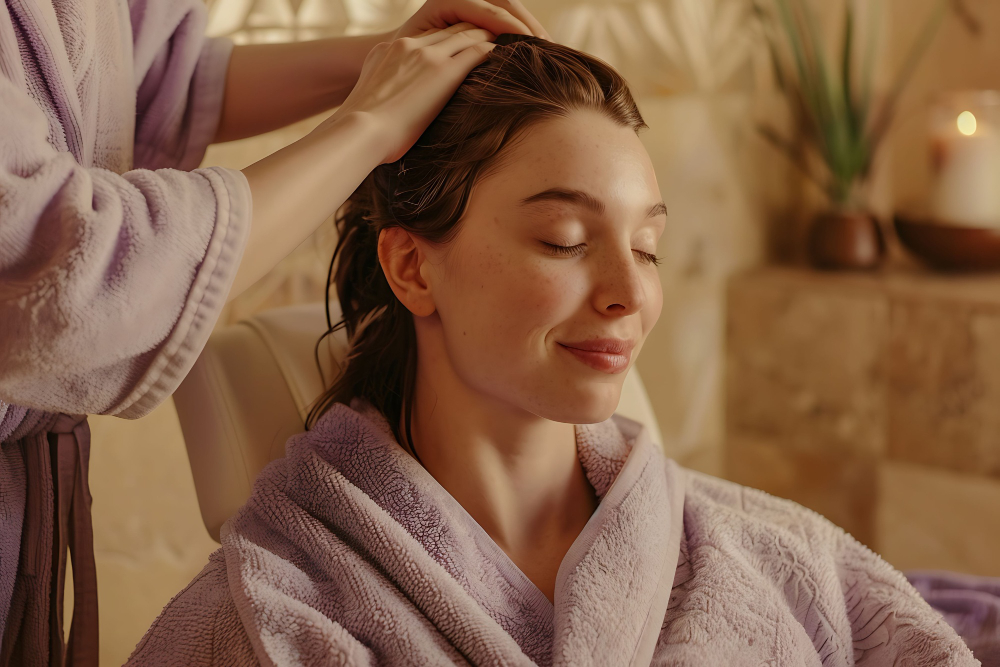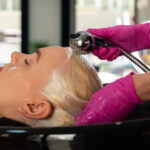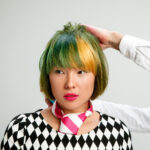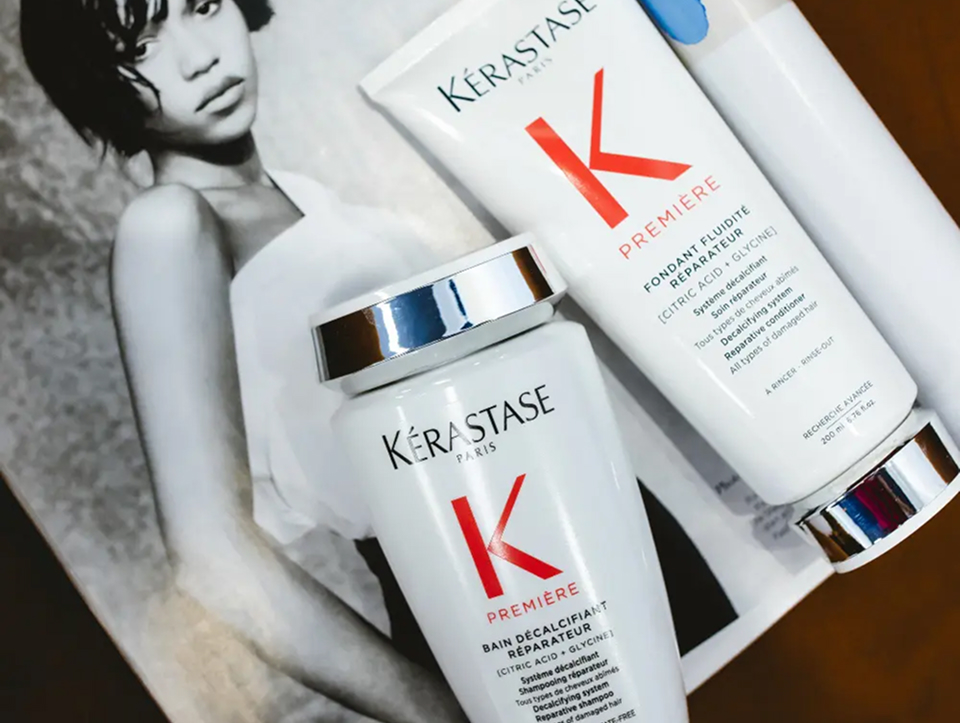Are you struggling with a dry, itchy scalp or noticing more hair fall than usual?
Finding the right solution can feel overwhelming with so many options available. Scalp therapy treatments might be the answer to restoring balance and vitality to your scalp.
Whether dealing with dandruff, irritation, or thinning hair, choosing the proper scalp treatment can make all the difference in achieving healthy, strong hair.
How to Identify Your Scalp Type

Before exploring all the scalp treatments, take control of your scalp health today. It empowers you to choose the right products and treatments that cater to your unique needs. Here are some examples of different scalp types:
- Oily Scalp: When your hair appears limp after washing and feels greasy, you likely have an oily scalp. The scalp produces excessive oil, leading to clogged pores and other related issues. This is where a treatment for an oily scalp can help.
- Sensitive Scalp: Your scalp will be more prone to redness, itching, and irritation. To prevent worsening the symptoms, you must treat your scalp gently.
- Dry Scalp: A dry scalp causes flakes and itching, making you uncomfortable. It can result from a lack of moisture or other skin disorders, such as psoriasis or eczema.
- Normal Scalp: A normal scalp with no excessive oil or dryness is healthy and balanced.
- Combination Scalp: If you notice oily and dry patches, it can become challenging to control the areas as you need different scalp treatments.
Selecting The Best Scalp Treatment

Great. Now that you have identified your scalp type, the next step is to pick an appropriate treatment. But first, you need to understand the conditions and symptoms. Here are some common scalp problems.
Dandruff
Dandruff is characterized by the presence of yellow or white flakes on the scalp and in the hair. Your head might be itching due to a yeast-like fungus, dry skin, or overgrowth.
Alopecia

The term refers to hair loss that results from conditions such as hormonal imbalances, autoimmune diseases, or genetic factors.
Eczema
Seborrheic Dermatitis is an irritation of the scalp characterized by redness and flakiness. Allergens, stress, and seasonal changes can provoke eczema.
Psoriasis
You notice scalp psoriasis from scaly to red areas on your scalp. It is painful and can start extending beyond your hairline.
A Self-Assessment of Your Condition
Now that you understand the different types of scalps and disorders, you can evaluate your condition and choose the appropriate scalp therapy treatment. We recommend asking yourself some questions while examining your scalp:
- How does your scalp feel? Is it dry, normal, greasy, or sensitive?
- Do you have an itchy scalp with flakiness?
- Or is the scalp red and inflamed?
- Are you seeing hair loss that can be a concern?
- Have you noticed any changes in your scalp health or the appearance of your hair?
When you ask yourself these self-assessment questions, you can determine the current state of your scalp and identify any underlying issues that may need attention.
However, if you’re unsure about the type of scalp you have, we at Häste are a hair and scalp spa that can help. Book an appointment today to receive our personalized recommendation for the best scalp therapy treatment for you.
Tips For Different Scalp Treatment Options

Considering your scalp condition and type will help you evaluate different treatment options. Here is a brief overview of the various scalp therapy treatments available.
1. Choosing a Shampoo and Conditioner
When selecting your shampoo and conditioner, we recommend choosing sulfate-free products that are suitable for your specific scalp type and condition.
You can use an anti-dandruff shampoo containing the active chemicals coal tar, ketoconazole, and zinc pyrithione to treat dandruff. We recommend using shampoos containing glycerin, aloe vera, or hyaluronic acid for dry scalps, as these ingredients help moisturize the scalp.
The best products for sensitive scalps are fragrance-free or hypoallergenic shampoos and conditioners.
2. Selecting Serums and Tonics For The Scalp

Serums and tonics are the most concentrated scalp therapy treatments for addressing specific concerns. For a scalp with dandruff, look for serums containing tea tree oil or salicylic acid. We recommend a peptide or vitamin tonic for optimal overall scalp health, as it helps stimulate hair growth.
3. Essential Oils and Natural Remedies as Scalp Therapy
If you have scalp issues and need relief, consider using essential oils such as peppermint, rosemary, and lavender. You can also choose coconut oil and aloe vera gel as natural therapies for their hydrating and soothing effects.
4. Get Better Scalp Health With Lifestyle Changes
A well-balanced diet, staying hydrated, and controlling stress can help improve scalp health. Avoid hairstyles that pull too tightly on your scalp, as they can also contribute to scalp problems and hair loss.
5. Always Read The Product Labels and Reviews

When you carefully study the product labels to verify if it is safe for your unique scalp type, it can help improve your condition. Also, check reviews on the shampoo and other products you plan to choose, as other people’s experiences using these products can be helpful.
6. Allergy Precautions and Patch Testing
Lastly, always perform a patch test before you use a new product. If the product contains powerful substances, check for adverse reactions and allergies. Suppose you are uncertain about a specific product. In that case, it is advisable to consult a dermatologist before incorporating it into your scalp care routine, especially if you have a history of sensitivities and allergies.
Worthy Note: Are you familiar with the various salon glossary terms? Check them out here to equip yourself with the correct terms when visiting the salon next time.
Wrap-Up: Choosing The Right Scalp Therapy Treatment
When you identify your scalp type and any underlying issues as the first step to selecting the best scalp therapy treatment, you are well on your way to healthy hair.
Remember that patience is vital when you opt for natural remedies, shampoos, conditioners, serums, or professional treatments. You can achieve and maintain healthy, lush locks with consistent care and the right products.
Still, if you need a high-quality scalp therapy treatment near Medford, backed by innovation and knowledge, Häste Urban Hair Spa is your go-to place. Furthermore, scalp therapy is often used in conjunction with split-end repair.
Chat with one of our stylists. They have a reputation for excellence in scalp care and offer a wide range of scalp therapy treatments to help you grow beautiful hair.
So, invest your time in making an appointment with one of our stylists and give your scalp the care it deserves.
FAQ
What is scalp therapy treatment?
Scalp therapy encompasses a range of procedures and products designed to maintain a healthy scalp. These treatments can address multiple issues, including dandruff, dryness, itchiness, hair thinning, and scalp irritation. They may include exfoliation, cleansing, hydration, and the application of specialized serums or oils.
Why is scalp health important?
A healthy scalp is essential for healthy hair growth. Issues such as dandruff, excessive oil production, or dryness can negatively impact hair follicles, potentially leading to hair thinning, breakage, or other scalp conditions. Regular scalp therapy can help balance the scalp environment, promoting optimal hair growth and reducing issues.
How do I know if I need a scalp therapy treatment?
Signs that you may need scalp therapy include itching, flakiness, redness, excessive oiliness, or hair loss. If you are experiencing any of these symptoms or have a diagnosed scalp condition, such as psoriasis or seborrheic dermatitis, a scalp therapy treatment may be beneficial.
How often should I get scalp therapy treatments?
The frequency of scalp therapy treatments depends on the specific condition and the type of treatment being administered. Generally, once-a-week or bi-weekly treatments are sufficient for most people. However, if you have a particular scalp issue, it may require more frequent or specialized treatment.
Can I do scalp therapy treatments at home or visit a professional?
Many scalp therapy treatments can be done at home using over-the-counter products or natural ingredients. However, consulting a professional is advisable if you have a severe scalp condition or are unsure of the best course of treatment.










